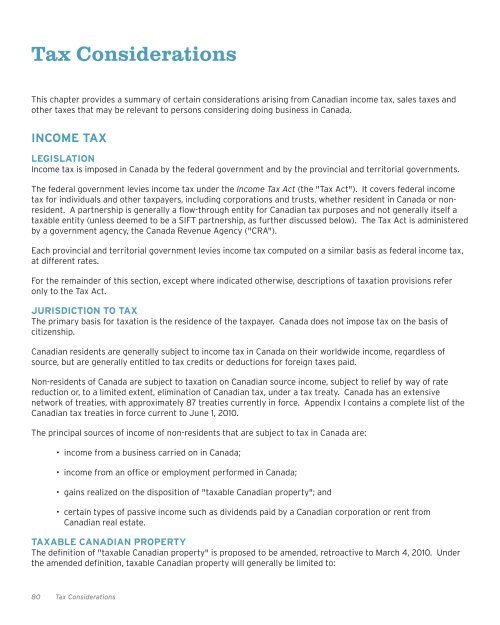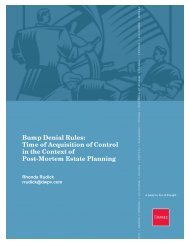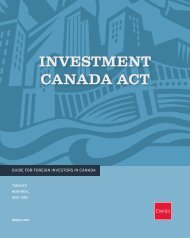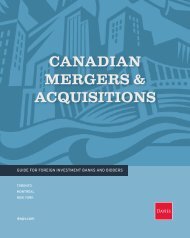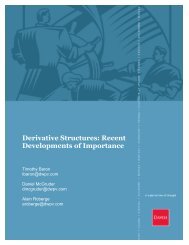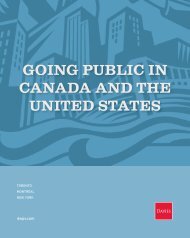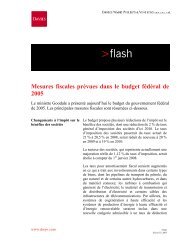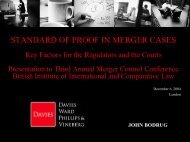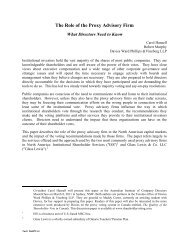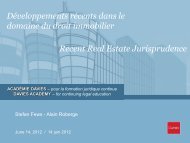doing business in canada - Davies Ward Phillips & Vineberg LLP
doing business in canada - Davies Ward Phillips & Vineberg LLP
doing business in canada - Davies Ward Phillips & Vineberg LLP
- No tags were found...
You also want an ePaper? Increase the reach of your titles
YUMPU automatically turns print PDFs into web optimized ePapers that Google loves.
Tax ConsiderationsThis chapter provides a summary of certa<strong>in</strong> considerations aris<strong>in</strong>g from Canadian <strong>in</strong>come tax, sales taxes andother taxes that may be relevant to persons consider<strong>in</strong>g <strong>do<strong>in</strong>g</strong> <strong>bus<strong>in</strong>ess</strong> <strong>in</strong> Canada.INCOME TAXLEGISLATIONIncome tax is imposed <strong>in</strong> Canada by the federal government and by the prov<strong>in</strong>cial and territorial governments.The federal government levies <strong>in</strong>come tax under the Income Tax Act (the "Tax Act"). It covers federal <strong>in</strong>cometax for <strong>in</strong>dividuals and other taxpayers, <strong>in</strong>clud<strong>in</strong>g corporations and trusts, whether resident <strong>in</strong> Canada or nonresident.A partnership is generally a flow-through entity for Canadian tax purposes and not generally itself ataxable entity (unless deemed to be a SIFT partnership, as further discussed below). The Tax Act is adm<strong>in</strong>isteredby a government agency, the Canada Revenue Agency ("CRA").Each prov<strong>in</strong>cial and territorial government levies <strong>in</strong>come tax computed on a similar basis as federal <strong>in</strong>come tax,at different rates.For the rema<strong>in</strong>der of this section, except where <strong>in</strong>dicated otherwise, descriptions of taxation provisions referonly to the Tax Act.JURISDICTION TO TAXThe primary basis for taxation is the residence of the taxpayer. Canada does not impose tax on the basis ofcitizenship.Canadian residents are generally subject to <strong>in</strong>come tax <strong>in</strong> Canada on their worldwide <strong>in</strong>come, regardless ofsource, but are generally entitled to tax credits or deductions for foreign taxes paid.Non-residents of Canada are subject to taxation on Canadian source <strong>in</strong>come, subject to relief by way of ratereduction or, to a limited extent, elim<strong>in</strong>ation of Canadian tax, under a tax treaty. Canada has an extensivenetwork of treaties, with approximately 87 treaties currently <strong>in</strong> force. Appendix I conta<strong>in</strong>s a complete list of theCanadian tax treaties <strong>in</strong> force current to June 1, 2010.The pr<strong>in</strong>cipal sources of <strong>in</strong>come of non-residents that are subject to tax <strong>in</strong> Canada are:• <strong>in</strong>come from a <strong>bus<strong>in</strong>ess</strong> carried on <strong>in</strong> Canada;• <strong>in</strong>come from an office or employment performed <strong>in</strong> Canada;• ga<strong>in</strong>s realized on the disposition of "taxable Canadian property"; and• certa<strong>in</strong> types of passive <strong>in</strong>come such as dividends paid by a Canadian corporation or rent fromCanadian real estate.TAXABLE CANADIAN PROPERTYThe def<strong>in</strong>ition of "taxable Canadian property" is proposed to be amended, retroactive to March 4, 2010. Underthe amended def<strong>in</strong>ition, taxable Canadian property will generally be limited to:80 Tax Considerations


